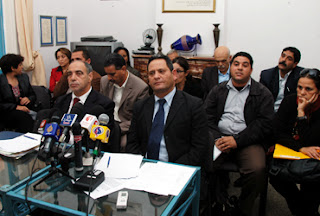On November 17, Mr. Effie Ncube, one of Zimbabwe’s principal civil
society leaders and director of the Matabeleland Constitutional Reform
Agenda, made reference to a broad range of transitional justice models
during a Food for Thought discussion organised by the American Corner at
the Bulawayo Public Library.
“There is no doubt in my mind that given a history of tyranny …
Zimbabwe needs a credible national transitional justice mechanism. This
is currently not being done by the Organ on National Healing.” Ncube led
the discussion with independent South African political analyst Leon Hartwell as part of the American Corner’s weekly public
discussion series. According to Hartwell, “Transitional justice debates
generally take place in countries emerging from conflict situations.
Victims rightfully demand some form of justice and accountability.”
“Of all the mechanisms available, retributive justice is probably the
most unlikely option at this point. The security sector will oppose it
and it is incredibly expensive. For example, the cost of International
Criminal Tribunal for Rwanda was roughly $1.3 billion between 1996 and
2009 while it detained a mere 74 individuals,” Hartwell continued.
Both speakers hinted that uncertainty regarding what would happen to
perpetrators contributes to the current political stalemate.
“Those in power are united by their fear of the crimes they committed
against their own people. They obviously understand that justice is
beckoning somewhere in the horizon but somehow hope to postpone the
inevitable course of justice and accountability.”
Hartwell argued that given the current balance of power, the MDC
formations could consider the possibility of extending conditional
amnesty to perpetrators of political violence. “Conditional amnesty
should focus on issues that would move the transition forward. That
means that political parties and the security sector should commit to
the establishment of a liberal constitution, allow civil society to
operate independently, support free media (especially broadcasting),
commit to free and fair elections, support a future truth and
reconciliation commission, and ratify international human rights
treaties.”
Ncube largely concurred that a truth commission is an attractive
option for Zimbabwe, but he argued that, “it cannot take place in a
constitutional and legal vacuum…. We need to dismantle the apparatus of
dictatorship first before anything credible can take place.” He also
cautioned that impunity should be avoided at all costs as “it is the
greatest threat to Zimbabwe.”
Both speakers said that past discussions on transitional justice
often brought attention to the willingness of victims to forgive their
perpetrators and that it is important to take a victim-centred approach
when considering the options for Zimbabwe.
“Every time I talk to victims of injustices committed since 1980, I
see a willingness to forgive and engage…. For me these are the critical
ingredients for any society that desires to move the transitional
justice path. I just hope we don’t see the recurrence of crimes against
the people to the extent that they end up taking the vengeance path.
It’s a choice that those in power have to make now”
Hartwell concluded the discussion by arguing that, “in South Africa,
it was largely conditional amnesty linked to the transition process that
helped the country to move forward. That is how the most racist regime
in the world came to an end. The security sector supported the
democratisation process, free and fair elections, and, although the
Truth and Reconciliation was opposed from many corners inside the
country, there were almost 22,000 victims and perpetrators that broke
the silence on what happened during the country’s violent (ZimEye)
Source: http://www.zimeye.org/?p=40730



